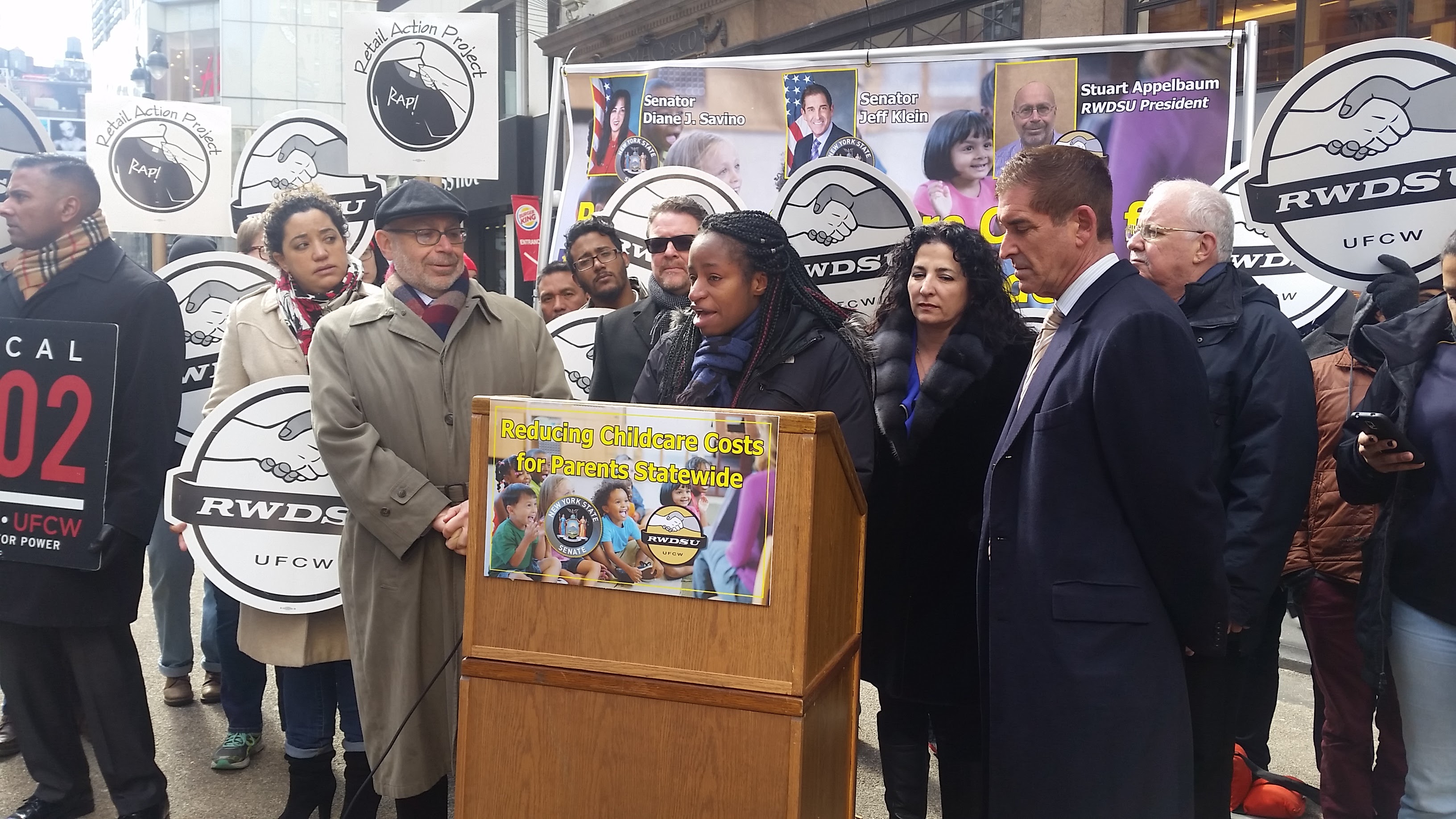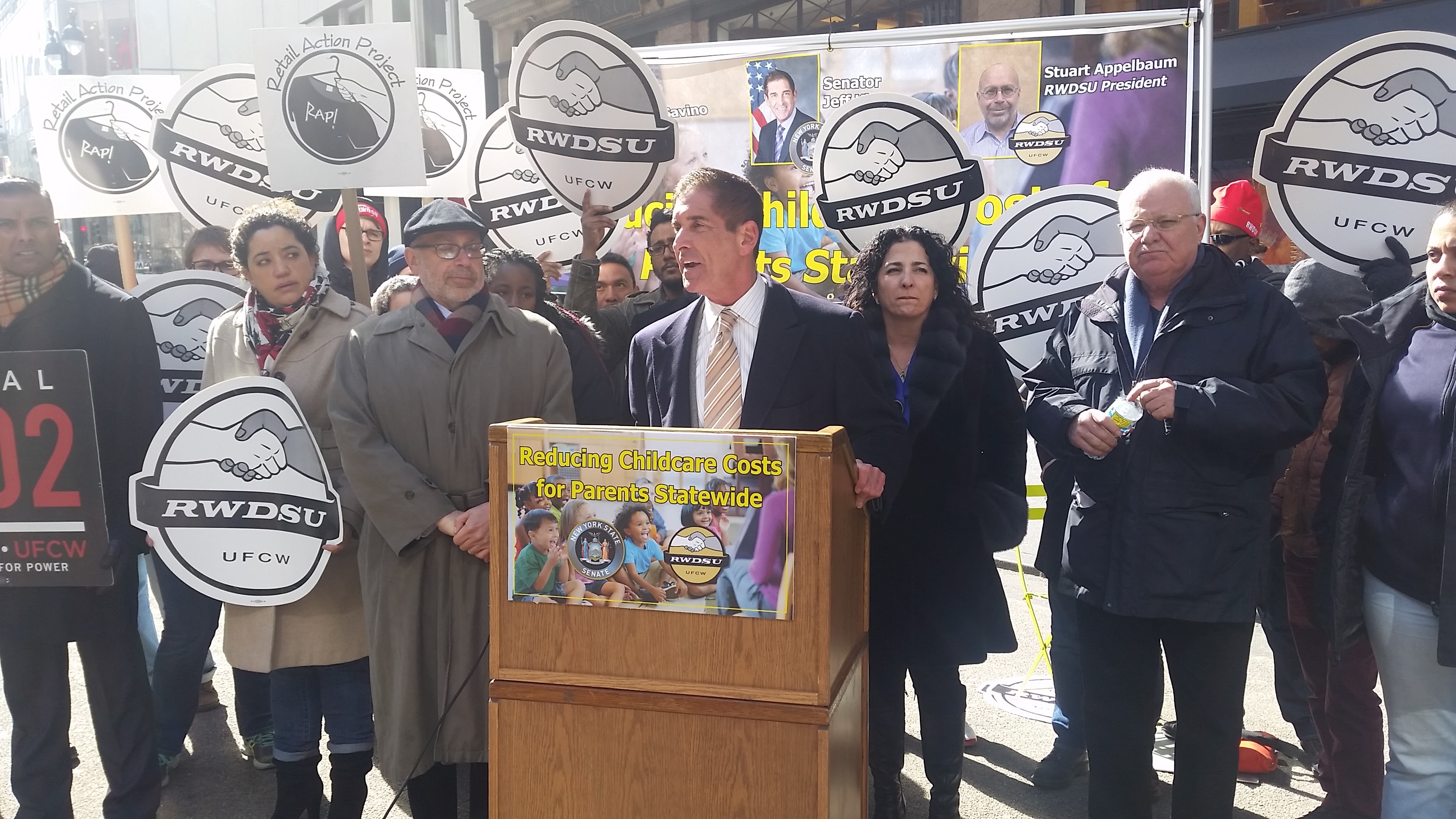Release shocking report: New York’s parents shell out highest percentage of annual income on child care in the country

Nakia Bouyer speaks about how vital this program has been for her as a working mother of two.
NEW YORK, NY – Independent Democratic Conference Leader Jeff Klein (D-Westchester/Bronx) and State Senator Diane Savino (D-Staten Island/Brooklyn) joined Stuart Appelbaum, president of the Retail, Wholesale and Department Stores Union, and Macy’s employees, retail workers, and working family advocates, in front of the iconic Macy’s Herald Square on Friday calling for increased funding to child care subsidies.
In New York where residents pay the highest percentage of their annual wages on child care, Macy’s associates and retail workers from the 34th Street Commercial Corridor were helped by a $500,000 allocation secured by the Independent Democratic Conference for the Facilitated Enrollment program. This critical subsidy helps working moms and dads afford day care and provides parenting education. Since its inception, the Facilitated Enrollment pilot program has helped over 6,400 children and 3,900 families.
To illustrate the need to expand this, and other subsidy and tax credit programs for safe, quality child care, the senators released, “New York 2020: Reducing Childcare Costs for Parents Statewide.”
The report paints a bleak picture for New York’s parents. Married couples spend a whopping 12.6 percent of their income on child care, while single parents spend an astronomical 45.1 percent. With ever-rising costs of living such as skyrocketing housing costs, New York was ranked as the least-affordable state in the nation for child care.
“For New York’s working parents, the biggest bite out of their budget, after housing, is safe, quality child care. In this city, a married couple pays 13 percent of their annual income – higher than any other state in the nation. New York’s parents shouldn’t be forced to make hard choices between leaving the workforce or dedicating their hard-earned paycheck just to child care. That is why I am proud to fight for access to safe, quality child care through the proposals laid out in this report. With increased funding and program expansion we can ensure that working parents aren’t forced to make hard choices between staying at home or sacrificing their paycheck to skyrocketing day care costs,” said Senator Jeff Klein.
“The reality is that many single mothers are footing a $11,700 bill on an under-$26,000 salary. While costs of living are rising, we have 40,000 families on the waiting list for child care subsidies. These are families that need relief from the child care cost burden, so that no mom has to sacrifice her career because it’s more economical for her to stay home. We want the best for our children and for our families, and that is just what these proposals do. With these subsidy expansions and tax credit enhancements, we can ensure that every child has access to the safe, quality care that they need, and that every parent can afford it,” said Senator Savino.
“Child care costs have spiraled out of control and working families — many of whom live paycheck to paycheck — desperately need the kind of help this program would give them. We strongly support the proposal from Senators Klein and Savino to extend and expand this desperately needed program,” Stuart Appelbaum, president of the Retail, Wholesale and Department Store Union.
|
Top 10 Least-Affordable States for Center-Based Care for a Four-Year-Old in 2014[1] |
||||||
|
State |
Average Annual Cost of 4-Year-Old Care in a Center* |
State Median Income for Single Mother Family** |
As a Percentage of Median Income for a Single Mother Family |
State Median Income for a Married Couple** |
As a Percentage of State and Median Income for a Married Couple |
Rank (Based on Percentage of State Median Income for a Married Couple) |
|
New York |
$11,700 |
$25,937 |
45.1 |
$93,157 |
12.6% |
1 |
|
Missouri |
$9,308 |
$21,892 |
42.5 |
$76,510 |
12.2% |
2 |
|
Vermont |
$9,970 |
$24,590 |
40.5 |
$83,160 |
12.0% |
3 |
|
Oregon |
$8,787 |
$22,326 |
39.4 |
$74,506 |
11.8% |
4 |
|
Minnesota |
$11,119 |
$26,795 |
41.5 |
$94,432 |
11.8% |
4 |
|
Nevada |
$8,118 |
$28,248 |
28.7 |
$69,580 |
11.7% |
6 |
|
Colorado |
$9,882 |
$28,222 |
35.0 |
$87,137 |
11.3% |
7 |
|
Massachusetts |
$12,781 |
$27,158 |
47.1 |
$112,824 |
11.3% |
7 |
|
Wisconsin |
$9,469 |
$23,702 |
40.0 |
$84,375 |
11.2% |
9 |
|
Washington |
$9,588 |
$25,856 |
37.1 |
$85,824 |
11.2% |
9 |
[1] Source: “Parents and the High Cost of Child Care: 2015 Report”, Child Care Aware of America.
The average cost of child care for a four-year-old in New York is $11,700. Across the state, the average ranged from $7,000 in the Southern Tier, to $19,000 per year in New York City. Families with multiple children often pay more in child care than for housing.
A combination of expanded subsidies, enhanced tax credits, and a new Working Families Child Care Tax Credit make up the Independent Democratic Conference’s new proposal.
The IDC would enhance the Facilitated Enrollment Child Care subsidy by increasing funding to $25 million and expanding eligibility to those within 400 percent of the Federal Poverty Line, which would increase access to a number of families, and serve approximately 2,571 additional children.
The report also proposes funding child care subsidies in New York by an additional $190 million, for a total of $1.166 billion. The proposal would increase funding for the Child Care Block Grant by $100 million, to add 13,000 new slots in child care centers. It would also pick up $90 million in funding for new federal mandates for background clearances, licensing and regulatory compliance, and training and professional development.
Finally, the IDC would expand the Child and Dependent Care Tax Credit, as well as create a new Working Families Child Tax Credit. The Child and Dependent Care Tax Credit has not been increased since 1999, while many families’ costs of living have increased dramatically. The IDC would increase this credit by 50 percent, with $90 million in additional funding, to ease the child care burden on taxpaying parents.
The Working Families Child Care Tax Credit would establish a new, refundable credit of $1,000 for working and middle class families. The credit would be available to approximately 200,000 families. By expanding current credit and establishing a new credit, the IDC’s proposal would help 712,000 families across New York State.
“Our members are often living paycheck to paycheck. When they have a child, they do not have a savings account built up for years in advance. The members who benefitted from the Facilitated Enrollment Child Care subsidy program in the past are so thrilled that they can finally get some assistance with the high cost of child care. The additional funds in the child care budget will help more working parents than last year. Each year we grow stronger,” said Henry Garrido, Executive Director, DC 37, AFSCME, one of the largest unions of NYC public sector employees.
“We cannot have real economic development unless we support quality, accessible child care for working parents. We applaud the IDC for recommending the allocation of $90 million in Child Care Development and Block Grant funding, $100 million in subsidy funding and $25 million for the expansion of the Facilitated Enrollment program which provides subsidies for families at slightly higher income levels. Child care costs in New York State are amongst the highest in the nation. The IDC’s proposal is a major step to providing support for working families so that they can be fully present at work knowing their children are in safe, quality care,” said Deborah King, Chair of the New York Union Child Care Coalition.
“Affordable, high quality child care is a critical workforce development support for both working families and the many New York State businesses that employ them. Too many families across New York State cannot afford the heavy cost of child care, which can jeopardize their stability in the workforce and cause attrition and reliability issues for their employers. The Workforce Development Institute supports the addition of $90 million in Child Care Development and Block Grant funding and $25 million for the expansion of the Facilitated Enrollment program, which provides subsidies for working families,” said Ed Murphy, Executive Director of the Workforce Development Institute.
“I am a current local 1102 member who has benefited from the child care program. I have two children ages nine and four. Both of my children attended a private daycare where the rate for my four-year-old is $150 a week and my daughter is $80 a week because she just does after school. Out of that $230 a week, I was only paying about $58 dollars a week for child care. It took a burden off my shoulders, with rent and bills and the cost of child care, I wouldn’t be able to have reliable child care and a job. This child care helps families, especially mothers like myself. If it is taken away many parents will have to pay high child care rates and still figure out how to provide for their homes. So let’s keep the fighting going so this can be one less thing families have to worry about,” said Nakia Bouyer, Local 1102 member and working mother of two.
“We are very grateful and satisfied with the facilitated enrollment childcare program, which has changed my life personally and economically. It has allowed me to live my life without stress about work. When I didn’t have the subsidy for childcare, because of the cost I couldn’t work the necessary hours to pay for it, and had to make difficult choices at the end of the month about which bills to pay on time. I also had a lot of difficulties with the babysitter relating to the care of my son. Now, with the childcare subsidy I feel secure about my babysitter because the program requires you to provide the paperwork and information about the caregiver that one should have about one’s babysitter. We have a wonderful babysitter who knows how to care for my son’s special needs. And I no longer have to worry about how I will afford her,” said Johanny Rodriguez, a Macy’s employee and working mother of a special needs son.

Senator Klein stands with Stuart Appelbaum (left), and Senator Savino (right).













Follow Us